Nutritious and easy to make, this vegetable omelette is the perfect breakfast or snack for babies and toddlers!
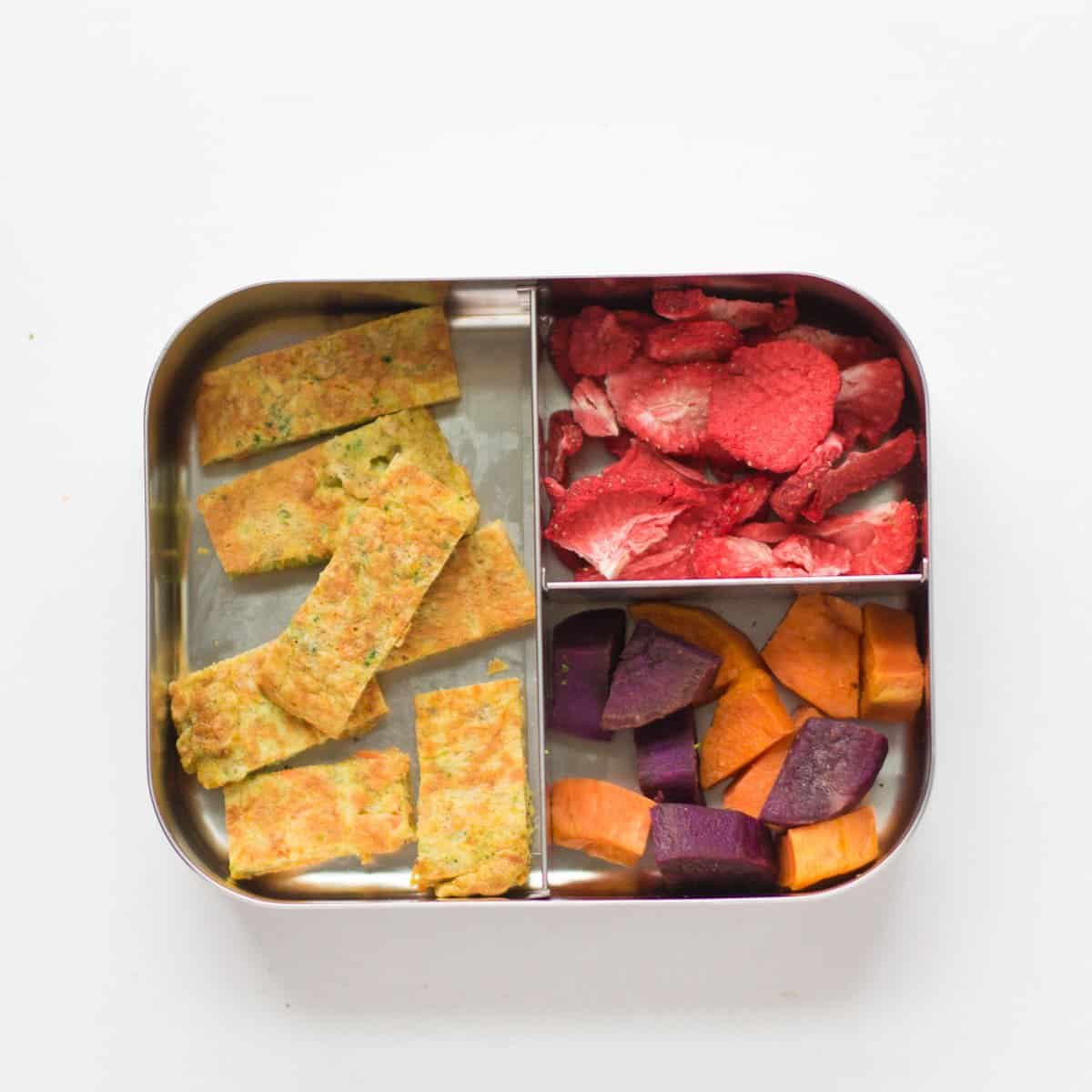
This post was created in partnership with Egg Nutrition Center. Thank you for supporting brands that I believe in and keeps this space running. As always, all opinions are my own!
In this blog post, I’ll be discussing the importance of proper nutrition and the key nutrients your child needs for optimal growth and neurodevelopment during infancy/toddlerhood. I’m also putting the spotlight on eggs, one of the most nutritious foods you can offer your baby as early as 6 months.
THE IMPORTANCE OF FIRST 1000 DAYS
Nutrition during pregnancy and the first two years of life (the first 1000 days) are extremely critical from a growth and developmental standpoint as well as in shaping food preferences and dietary habits.
High quality nutrition sets the framework for the development of cognitive, motor, and social and emotional skills throughout life.
Research shows that the majority of the brain’s structure is shaped during these early days and that nutrition inadequacy during this period may actually compromise its structural development, resulting in lifelong deficits in brain function (1, 2). Thus, proper nutrition is so important in providing both the building blocks and the fuel for the brain.
While all nutrients play a role in optimizing brain growth and development, here are the key ones that are especially important during this time period: protein, zinc, iron, choline, folate, iodine, vitamins: A, D, B6, B12, and long-chain polyunsaturated fatty acids (PUFAs).
The nutrient that surprised me the most was choline. This under-consumed, lesser-known essential nutrient (meaning it must be consumed in the diet to meet the body’s needs) helps the baby’s brain and spinal cord to develop properly during pregnancy and is necessary for continued brain development and learning during the child’s early years.
Recognizing its utmost importance, the American Medical Association recommended the nutrient be added to all prenatal vitamin supplements back in 2017 (3).
Now that I’ve shared with you the importance of proper nutrition during the first 1000 days, particularly for neurodevelopment, I want to put the spotlight on one of my favorite foods - EGGS.
Eggs as First Food for Babies
I love eggs because they’re so nutrient-dense, affordable, easily accessible, and super versatile!
Did you know that eggs are a good or excellent source of 8 essential nutrients, including varying amounts of the key nutrients that I mentioned above: protein, zinc, iron, choline, folate, iodine, vitamins: A, D, B6, B12, and PUFAs! (Fun fact: Eggs are one of the few natural food sources of vitamin D (1 mcg)
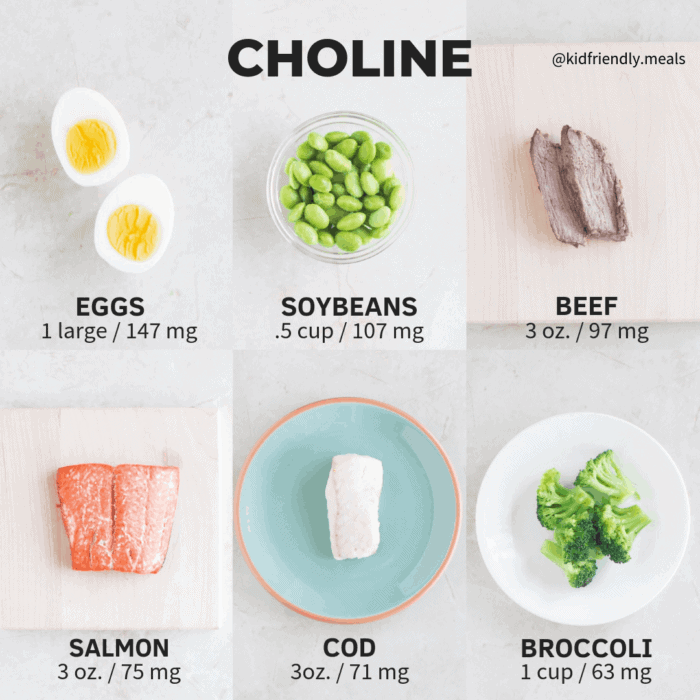
Eggs are also one of the richest sources for choline. Two large eggs contain about 300 milligrams of choline, which is more than half the recommended amount for pregnant women (450mg/day).
All this to say, if you’re pregnant and breastfeeding, be sure to enjoy this nutrient powerhouse on a regular basis! As for your baby, I recommend introducing eggs as soon as he/she is ready to start solids.
Related: Easy Egg Recipes for Babies
Vegetable Omelette for Babies
This is slightly different from a traditional omelette in that it is made with flour. Think of it as a cross between an omelette and a pancake. It's an awesome way to incorporate different flavors and textures into one bite.
Even if your baby doesn't have any teeth, they will be able to chew and grind this up with their powerful gums! They also travel really well, making them perfect for picnics, daycare or preschool.
And If you are looking for super soft, fluffy eggs, then try these scrambled eggs.
Ingredients
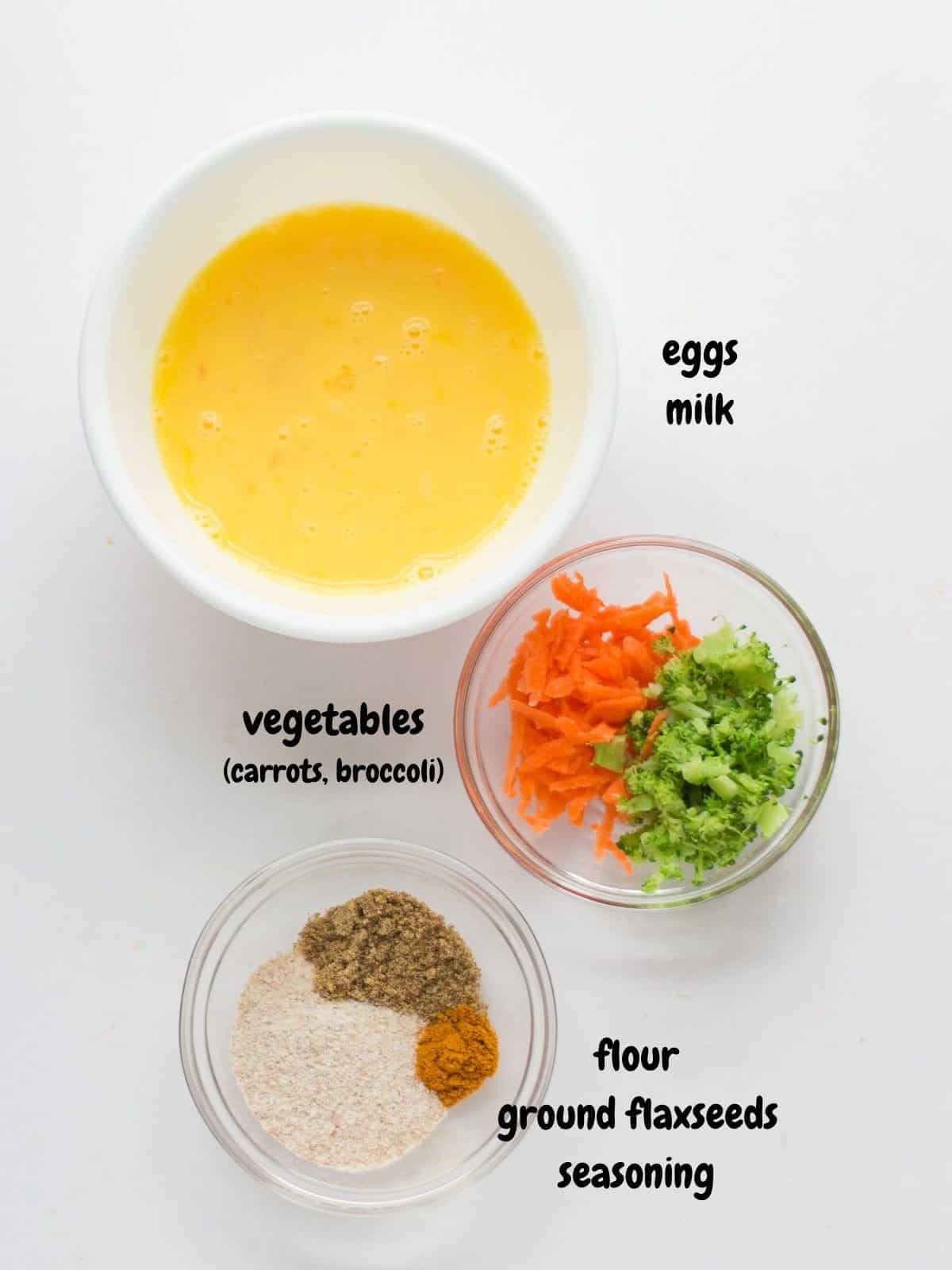
Feel free to customize this by using whatever vegetables you have on hand, herbs/spices you fancy, and milk and flour of choice.
Step by Step Instructions

- Beat eggs and milk together in a bowl until blended. Add rest of the ingredients and combine.
- Heat butter/oil in a 6-8 inch nonstick pan over medium-low heat, tilting the pan to coat bottom. Pour in the mixture (don’t stir), spread evenly, and let the batter cook for a minute or so until the bottom starts to set.
- Flip and cook the other side until lightly browned.
- Remove from pan. Once cooled, slice into desired shapes.
Tips for Success
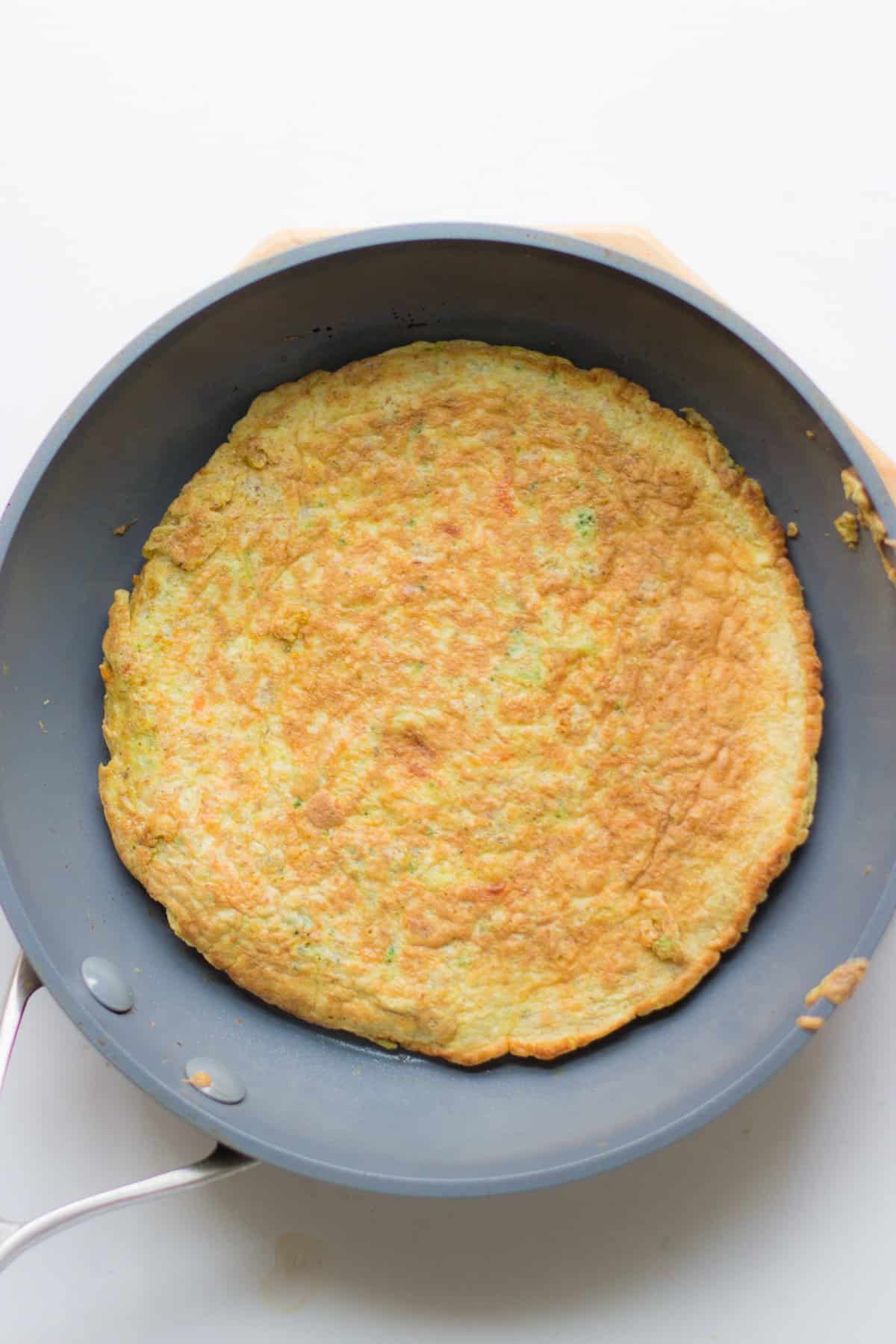
- Ditch the fork and whisk the eggs and milk REALLY well until uniform in appearance. This ensures that the egg yolks and whites mix together completely and adds air to the eggs, making them extra fluffy.
- Use a smaller pan for a thicker omelette. This pan is perfect!
- Cook over medium to medium-low heat so it doesn’t brown too quickly.
Omelette for Baby Led Weaning
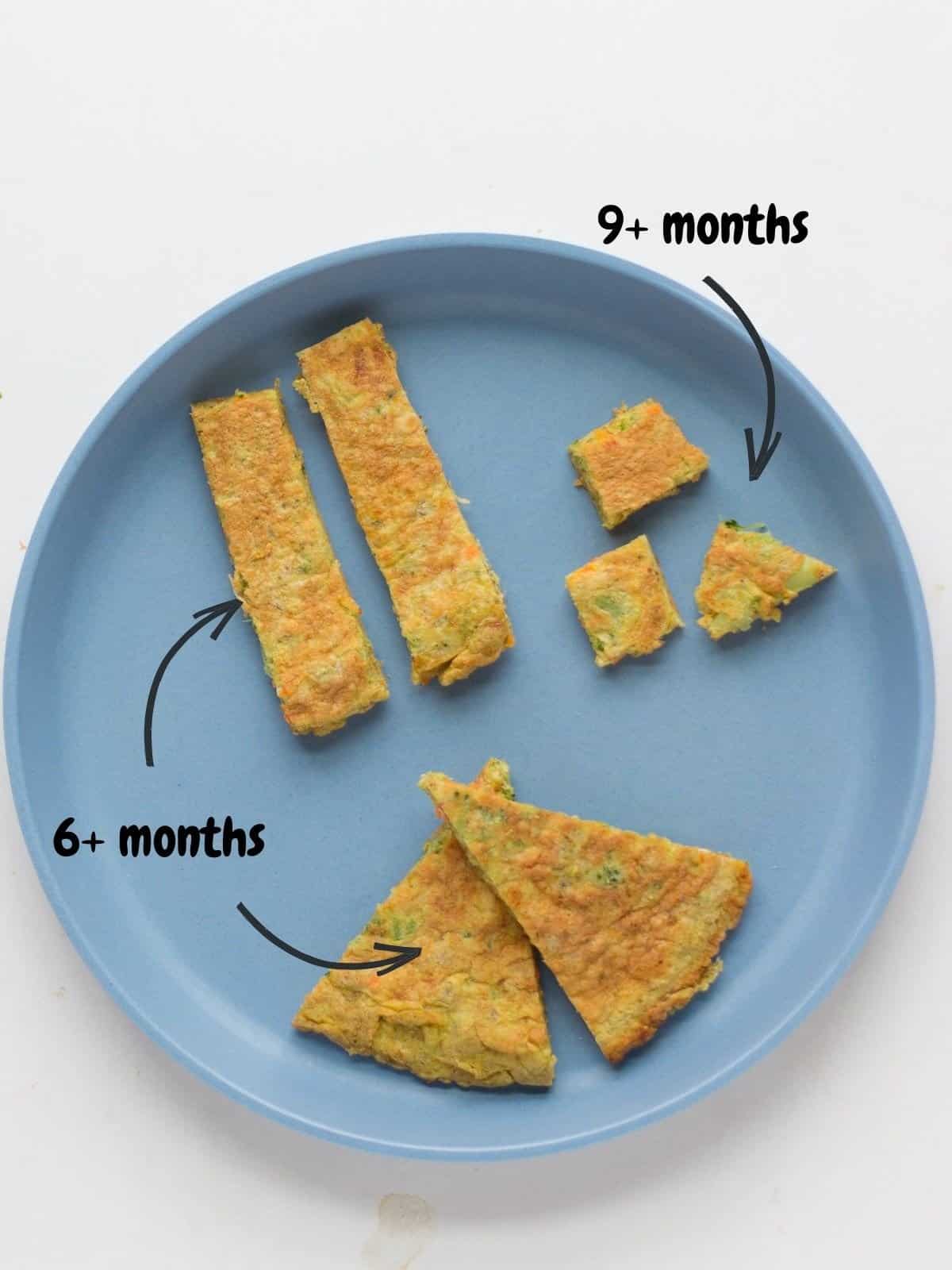
For 6+ month olds, bigger is better and safer! Slice into strips to make it easier for them to grab with their palms. Once they develop their pincer grasp, you can cut into bite sizes pieces.
I emphasize this because my son was the ultimate shoveler, and cutting into small pieces only made it worse. With my second baby, I offered her large pieces along with bite-sized pieces, and it’s definitely helped her to slow down and to take bites rather than shovel.
Storage Suggestions
You can transfer to an airtight container and keep in the refrigerator for up to 3 days. You can also freeze for up to 3 months. I recommend slicing and flash freezing so you can easily pull out exactly how much you need.
Did you make this recipe? Leave a rating below and let me know how you liked the recipe! Your feedback means so much to me!
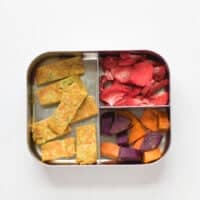
Vegetable Omelette
Equipment
Ingredients
- ½ teaspoon oil or butter
- 2 eggs
- 1 tablespoon milk of choice can use breastmilk
- 3 tablespoons of vegetable s of choice: in here, I used spinach, grated raw carrots, cooked broccoli
- 1 tablespoon flour of choice I personally like to use spelt
- 1 teaspoon ground flaxseeds
- ¼ teaspoon herbs/spices of choice e.g. cinnamon, curry powder, cumin, oregano, turmeric
Instructions
- Beat eggs and milk together in a bowl until blended. Add rest of the ingredients and combine.
- Heat butter/oil in a 6 to 8 inch nonstick pan over medium-low heat, tilting the pan to coat bottom (see note)
- Pour in the mixture (don’t stir), spread evenly, and let the batter cook for a minute or so until the bottom starts to set.
- Flip and cook the other side until lightly browned.
- Remove from pan. Once cooled, slice into desired shapes.
Notes
Can serve as is or spread nut butters, avocado, Greek yogurt, etc. on top/ If you don't have a 6-8 inch pan or want to make these pancakes thicker, pour in the egg mixture and as eggs start to set, fold the pancake in half. Finally cook until the inside is completely cooked, about 2-3 minutes.
Nutrition
References
- Benton, D. (2008). The influence of children’s diet on their cognition and behavior. European Journal of Nutrition, 47(S3), 25-37. doi:10.1007/s00394-008-3003-x
- Schwarzenberg, S. J., & Georgieff, M. K. (2018). Advocacy for Improving Nutrition in the First 1000 Days to Support Childhood Development and Adult Health. Pediatrics,141(2). doi:10.1542/peds.2017-3716
- AMA backs global health experts in calling infertility a disease. (n.d.). Retrieved from https://www.ama-assn.org/delivering-care/public-health/ama-backs-global-health-experts-calling-infertility-disease
- Chipps, B. E. (2015). Randomized Trial of Peanut Consumption in Infants at Risk for Peanut Allergy. Pediatrics,136(Supplement). doi:10.1542/peds.2015-2776ff
- Toit, G. D., Sayre, P. H., Roberts, G., Sever, M. L., Lawson, K., Bahnson, H. T., . . . Lack, G. (2016). Effect of Avoidance on Peanut Allergy after Early Peanut Consumption. New England Journal of Medicine,374(15), 1435-1443. doi:10.1056/nejmoa1514209
- Leonard, S. A., & Nowak-Wêgrzyn, A. (2011). Can Early Introduction of Egg Prevent Egg Allergy in Infants? A Population-Based Study. Pediatrics,128(Supplement 3). doi:10.1542/peds.2011-2107v
- Lippner, E., & Dinakar, C. (2017). Timing of Allergenic Food Introduction to the Infant Diet and Risk of Allergic or Autoimmune Disease: A Systematic Review and Meta-analysis. Pediatrics,140(Supplement 3). doi:10.1542/peds.2017-2475mm
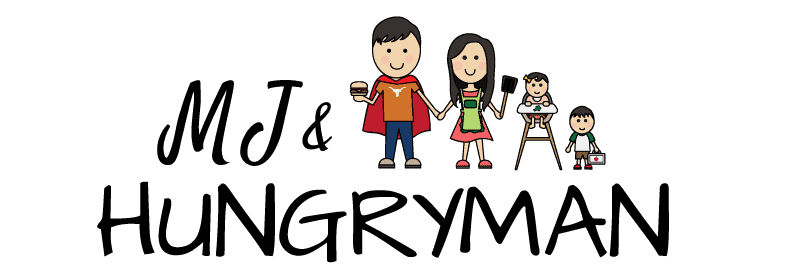
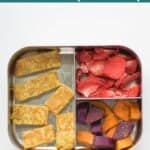

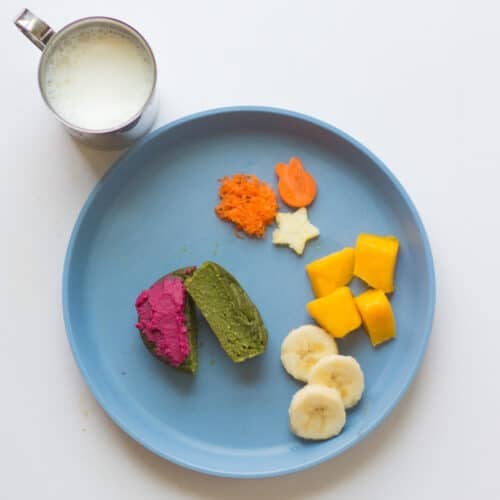
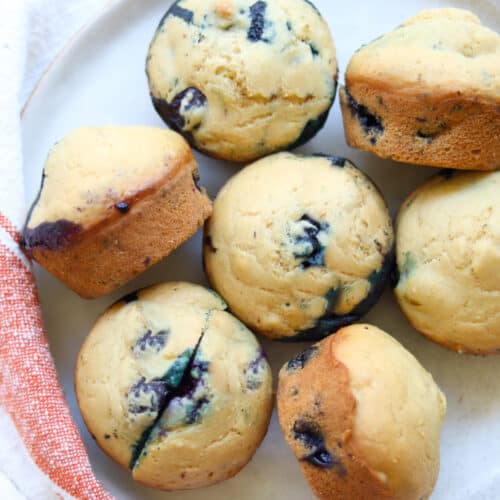
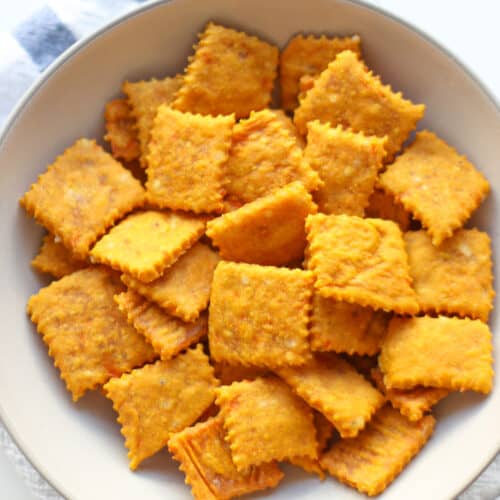

Jenny says
Just tried this over the past week and had to make it TWICE for lunches because my son just loves it so much. I used grated carrots, spinach, and zucchini and the spice I used is curry powder. I put a light coating of peanut butter over it to serve. So yummy!
Do you have a favorite spice to add to this, Min? My boy loves the curry but not sure which to try next!
Min says
Love hearing that! I love adding Italian seasoning and we often do garlic powder and sesame oil!
Loann says
Can I omit flour?
And use eggs, formula, and veggies only?
Thank you!
Min says
Yes you can!
Maddison says
6 month old loves her veggie omelette! Super easy to make there’s plenty for later.
Min says
I'm so glad!! This was one of my son's fav when he was that age too!
Phoebe says
Hi Min is this suitable for 7 months?
Min says
yes!
Samantha Kennerson says
Thank you! This is one of go-tos!!